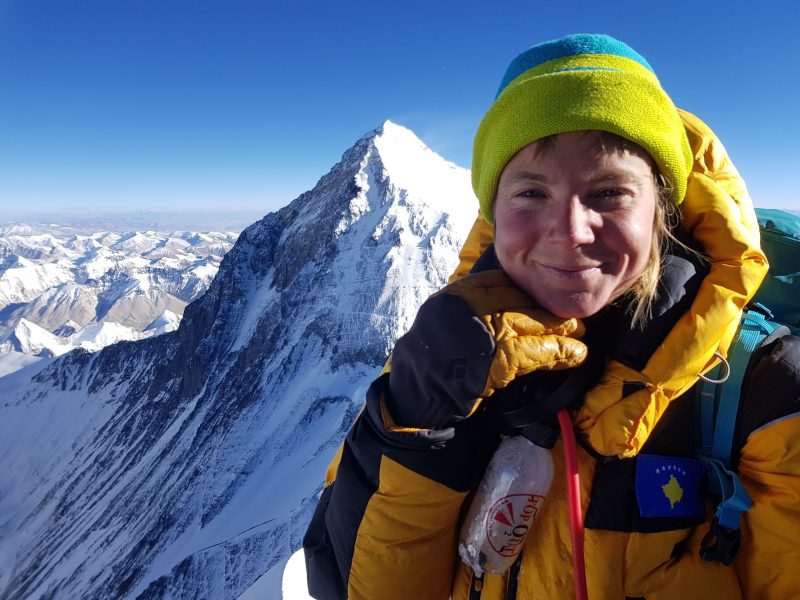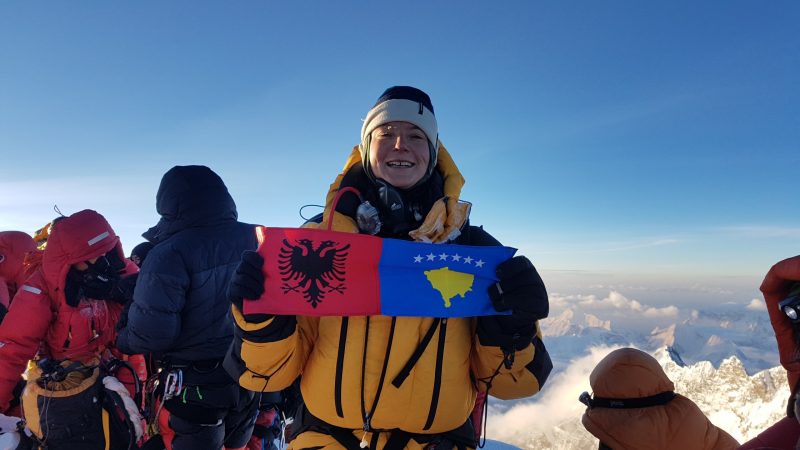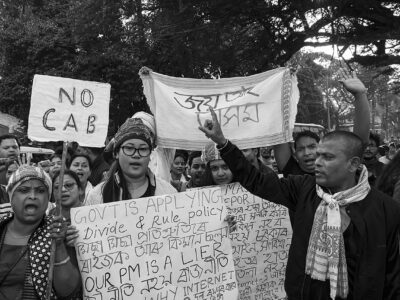
Uta Ibrahimi. Foto usada con su autorización.
Uta Ibrahimi, alpinista de Kosovo, es la primera mujer de etnia albanesa en escalar el monte Everest, lo que hizo el 22 de mayo de 2017. Después, escaló el Manaslu, el Cho-Oyu, el Lhotse y el Gasherbrum, con lo que oficialmente es la primera mujer de los Balcanes en llegar a la cumbre de cinco picos de más de 8000 metros.
A través de su alpinismo y sus apariciones en los medios, Uta trata de crear conciencia sobre la naturaleza, las montañas y los derechos humanos, especialmente en Kosovo y Albania. Uta es también defensora de los Objetivos de Desarrollo Sostenible, que promueve la igualdad de género, la capacitación de los jóvenes y la preservación del medio ambiente.
En esta entrevista podrás leer más sobre sus aventuras de montañismo y los retos que enfrenta.

Uta Ibrahimi. Foto usada con su autorización.
Global Voices (GV): ¿Cómo empezó tu carrera en el alpinismo? ¿Cuándo nació su amor por el alpinismo y la escalada?
Uta Ibrahimi (UI): I started my hiking activity with professional mountaineers on 22 of May, 2011. Before that I had only practiced short hikes with my family.
Thanks to the guides, who are husband and wife, that was the day I realized that women and girls can be great mountaineers. Later on, I met many strong and tough women who shared a common passion for the mountains and blew my mind with their power.
Later, in 2015, after climbing Mont Blanc, the love of mountains became my biggest passion. I decided to leave my 12-year career in marketing and a job at one of the most famous agencies in Kosovo, only to get closer to land and sky, and my inner self.
Uta Ibrahimi (UI): Comencé mi actividad de montañismo con profesionales el 22 de mayo de 2011. Antes solo había practicado pequeñas excursiones con mi familia.
Gracias a mis guías, una pareja de esposos, fue ahí que me di cuenta de que las mujeres y las niñas pueden ser grandes montañeras. Más tarde, conocí a muchas mujeres fuertes y duras que compartían la pasión por las montañas y quedé asombrada con su poder.
Luego, en 2015, tras escalar el monte Blanc, el amor por las montañas se convirtió en mi mayor pasión. Decidí dejar mi carrera de 12 años en marketing y un trabajo en una de las agencias más famosas de Kosovo para acercarme a la tierra y al cielo, y a mi yo interior.

Uta Ibrahimi. Foto usada con su autorización.
GV: ¿Cómo te preparaste para escalar el monte Everest? ¿Qué sentiste de ser la primera persona de tu país en la cima del mundo?
UI: My biggest experience in mountaineering was definitely in 2016 in the Himalayas, where I had gone for training in high altitudes.
I met a lot of people, learned a lot about climbing high mountains, and most importantly I realized I was physically and mentally prepared to test myself and realize my dream.
As soon as I came back in Kosovo, I started my project to make it work. Everything was harder from what I expected it to be, be it the physical challenges, psychological preparation and the financial aspect.
In order to climb high dangerous mountains, what you need most is the love and moral support of your community. I didn’t receive that in the very beginning, mainly coming from a deep concern of these people about what could happen to me in these altitudes. I also encountered lack of faith in the power of women, even though a lot of women had already proven themselves to be equal with men in this sport.
The more one climbs the peaks of the world, the more one needs the love of the people—the moral support.
Reaching the top of the world remains one of the biggest accomplishments in my life, and one of the best feelings in my entire life. To witness the sunrise in 8000+ meters, surrounded by absolute silence is like being born for the second time, but this time fully aware and at peace, filled with positivity and joy.
On the other hand, I am very happy that with all the hard work I achieved something for myself and my country. I made my nation proud by waving the Albanian and Kosovo flags for the first time at the top of the world, becoming the first Albanian woman to summit Mount Everest.
After the summit on Everest, I have started the project on climbing the 14 highest mountains in the world—there are only 4 women in the world that have summited till now. I have now climbed 6 of them, by becoming the only girl from the Balkan with 6 summits on 8000 meters peak, and waving Albanian and Kosovo flag for the first time on each. Now, I am on preparation to climb the 8 remaining peaks, all the time training and working for the funding my expedition.
IU: Sin duda, mi mayor experiencia en el alpinismo fue en 2016 en el Himalaya, donde había ido a entrenar a grandes alturas.
Conocí a mucha gente, aprendí mucho sobre la escalada de alta montaña y, lo más importante, me di cuenta de que estaba preparada física y mentalmente para ponerme a prueba y cumplir mi sueño.
En cuanto volví a Kosovo, empecé mi proyecto para hacerlo realidad. Todo fue más difícil de lo que esperaba, los retos físicos, la preparación psicológica y el aspecto financiero.
Para escalar altas y peligrosas montañas, lo que más necesitas es el amor y el apoyo moral de tu comunidad. Al principio no lo recibí, sobre todo por la profunda preocupación de esta gente por lo que pudiera pasarme en estas altitudes. También me encontré con falta de fe en el poder de las mujeres, a pesar de que muchas ya habían demostrado ser iguales a los hombres en este deporte.
Cuanto más se sube a las cumbres del mundo, más se necesita el amor de la gente, el apoyo moral.
Llegar a la cima del mundo sigue siendo uno de los mayores logros de mi vida, y una de las mejores sensaciones que he tenido. Presenciar el amanecer a más de 8000 metros, rodeada de un silencio absoluto, es como volver a nacer, pero esta vez plenamente consciente y en paz, llena de positividad y alegría.
Por otra parte, estoy muy contenta de que con todo el trabajo duro haya conseguido algo para mí y para mi país. Hice que mi nación se sintiera orgullosa de ondear por primera vez las banderas de Albania y Kosovo en la cima del mundo, cuando me convertí en la primera albanesa en legar a la cumbre en el monte Everest.
Después de la cumbre del Everest, inicié el proyecto de escalar las 14 montañas más altas del mundo; hasta ahora solo hay cuatro mujeres en el mundo que han llegado a la cumbre. Ahora he escalado seis cumbres, soy la única mujer de los Balcanes con seis cumbres en picos de 8000 metros, que ha ondeado la bandera de Albania y Kosovo por primera vez en cada una. Ahora me estoy preparando para escalar los ocho picos restantes, entreno y trabajo para financiar mi expedición.

Uta Ibrahimi. Foto usada con su autorización.
GV: Una de tus misiones es crear conciencia sobre la naturaleza, la montaña y la protección del ambiente; ¿qué actividades realizas en ese ámbito?
UI: To participate in projects that embrace the values of my activism as an SDG champion, supported by both the public and private sector, I have founded an NGO called Utalaya Foundation. Through our foundation we target different audiences, mainly focusing on marginalized groups in Kosovo such as: women, minority communities, children and youth, children with special needs, youth from rural areas etc.
We try to engage this audience as much as possible in projects that raise awareness on environmental protection.
For instance, recently we had a great cooperation with the municipality of Prishtina, engaging children with autism and Down syndrome, their caretakers and their parents with recreational and environmentally educational activities in the Bear Sanctuary in Prishtina-Germia Hill. We combined learning on importance of preserving nature and biodiversity with yoga, meditation, hiking and games that enhance their cognitive, behavioral and motor skills with different experts such as speech therapists, artists, instructors etc.
I very often participate voluntarily in calls from different organizations to be their voice of campaigns regarding women empowerment, environmental protection, human rights, children rights etc.
We are currently starting an awareness campaign with the World Wide Fund for Nature advocating the preservation of the Sharr Mountains National Park in Kosovo.
We are also going to take part in a project supported by the ministry of culture, youth and sports to engage the youth from rural areas to consciously use the natural resources and cherish the natural blessings our country offers us.
IU: Para participar en proyectos que abarcan los valores de mi activismo como defensora de los objeticos de desarrollo sostenible, con el apoyo del sector público y privado, he fundado la ONG Fundación Utalaya. A través de nuestra fundación nos dirigimos a diferentes públicos, sobre todo en los grupos marginados de Kosovo, como mujeres, comunidades minoritarias, niños y jóvenes, niños con necesidades especiales, jóvenes de zonas rurales, etc.
Intentamos involucrar a este público en la medida de lo posible en proyectos sobre la protección del ambiente.
Por ejemplo, recientemente hemos tenido gran cooperación con el municipio de Pristina, hemos involucrado a niños con autismo y síndrome de Down, a sus cuidadores y a sus padres en actividades recreativas y de educación ambiental en el Santuario de los Osos en la colina Pristina-Germia. Combinamos el aprendizaje sobre la importancia de preservar la naturaleza y la biodiversidad con el yoga, la meditación, el montasmo y los juegos que mejoran sus habilidades cognitivas, conductuales y motoras con diferentes expertos como logopedas, artistas, instructores, etc.
Muy a menudo participo voluntariamente en convocatorias de diferentes organizaciones para ser su voz en campañas relacionadas con empoderamiento de la mujer, protección del ambiente, derechos humanos, derechos de los niños, etc.
Actualmente estamos iniciando una campaña de sensibilización con el Fondo Mundial para la Naturaleza que aboga por la preservación del parque nacional de las montañas Sharr en Kosovo.
También vamos a participar en un proyecto apoyado por el Ministerio de Cultura, Juventud y Deportes para involucrar a los jóvenes de las zonas rurales en el uso consciente de los recursos naturales y en la apreciación de las bendiciones naturales que ofrece nuestro país.

Uta Ibrahimi. Foto usada con su autorización.
GV: Como defensora de la igualdad de género, ¿puedes describir qué estrategia usas para poner en práctica este importante compromiso?
UI: I have always been blessed to be surrounded by wonderful and inspiring women, starting from my mom, sisters, friends, co-workers and work partners, therefore I’ve always found joy in creating something together with women.
It’s not like I use a strategy; gender advocacy has become an unshakable part of my character since a very young age, and I try to do everything I can to empower women, such as hiring them in my hiking company, or foundation. In different projects I always engage women in activities that empower them and remove all stigma or prejudice created from our society.
Vulnerable groups are the main target and value of our foundation, and clearly women and girls do not exercise all their rights in Kosovo. Yet, hopefully with engagement, empowerment and advocacy this will change, and it has already started to change. So gender equality is not a strategy, it’s a moral value, it’s a lifestyle and obligation we must all apply.
IU: Siempre he tenido la suerte de estar rodeada de mujeres maravillosas e inspiradoras, desde mi madre, mis hermanas, mis amigas, mis compañeras de trabajo y mis colegas, por lo que siempre he encontrado la alegría de crear algo junto a mujeres.
No uso una estrategia; la defensa del género se ha convertido en una parte inamovible de mi carácter desde muy chica, y trato de hacer todo lo que puedo para fortalecer a las mujeres, como contratarlas en mi empresa de montañismo, o en mi fundación. En diferentes proyectos siempre involucro a las mujeres en actividades que las fortalezcan y eliminen todo estigma o prejuicio creado desde nuestra sociedad.
Los grupos vulnerables son el principal objetivo y valor de nuestra fundación, y está claro que lmujeres y niñas no ejercen todos sus derechos en Kosovo. Sin embargo, esperamos que con el compromiso, el empoderamiento y la promoción esto cambie, y ya ha empezado a cambiar. Así que la igualdad de género no es una estrategia, es un valor moral, un estilo de vida y una obligación que todos debemos aplicar.

Uta Ibrahimi. Foto usada con su autorización.
GV: Por último, ¿tienes alguna recomendación para los jóvenes escaladores y montañistas, a qué deben prestar especial atención, para que puedan estar seguros en la montaña?
UI: Youngsters, but also other age groups, should realize that it is never too late to start practicing outdoor sports and activities such as mountaineering or alpinism. The most important thing and message from me to my fellow alpinists is to stay safe in the mountains and not damage nature. A good mountaineer and alpinist is someone who protects and preserves nature at all cost. The fulfilment we take from mother earth has to be repaid with deep care and compassion.
IU: Los jóvenes, pero también otros grupos de edad, deberían darse cuenta de que nunca es demasiado tarde para empezar a practicar deportes y actividades al aire libre como montañismo o alpinismo. Lo más importante y el mensaje que doy a mis compañeros alpinistas es que se mantengan seguros en la montaña y no dañen la naturaleza. Un buen montañero y alpinista es alguien que protege y preserva la naturaleza a toda costa. La satisfacción que obtenemos de la madre tierra tiene que ser devuelta con profundo cuidado y compasión.






